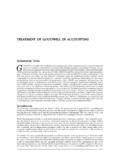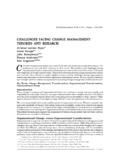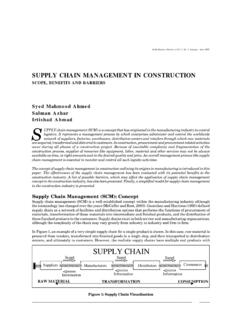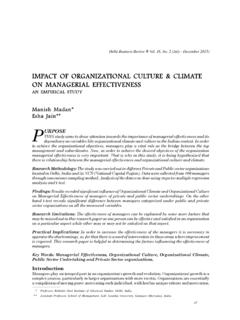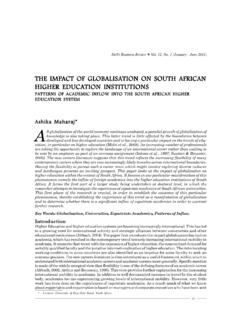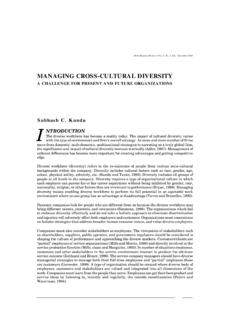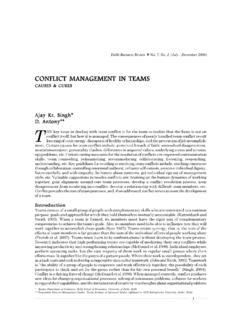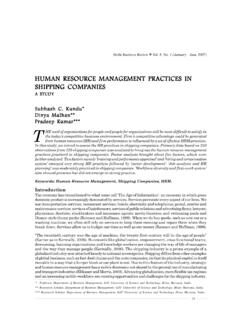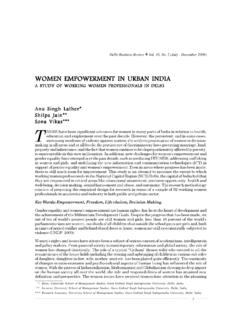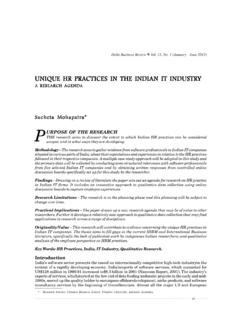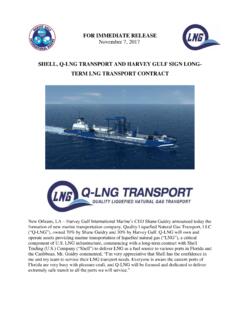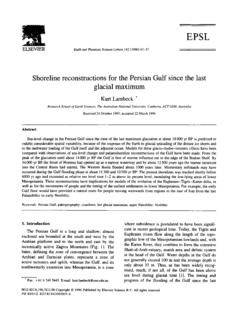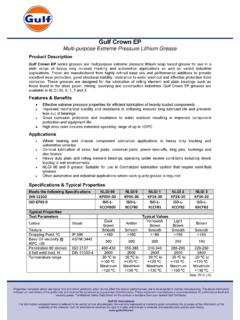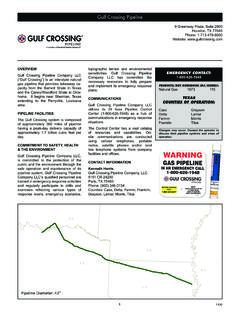Transcription of HARMONIZATION OF ACCOUNTING STANDARDS IN …
1 Delhi Business Review ? Vol. 4, No. 1, January - June 2003. HARMONIZATION OF ACCOUNTING STANDARDS IN. gulf countries . Joshi Jawahar Al -Mudahki I NTRODUCTION. ONCE Sir Bryan Carsberg (1996) former IASC's Secretary General stated that this is a sign of the times. The world is becoming a global marketplace and one can't refuse to recognize that . This statement has its long term implications because in today's fast globalization of trade and investment, HARMONIZATION of financial information at national or regional levels is not enough. The accountancy profession has long recognized the need for a globally harmonized accountancy framework. Samuels and Piper (1985) define the HARMONIZATION of ACCOUNTING as an attempt to bring together different systems.
2 It is the process of blending and combining various practices into an orderly structure, which produces a synergistic result . While some see HARMONIZATION more as a process of moving to a system of uniformity or standardization, most view HARMONIZATION as a process whereby the number of allowed ACCOUNTING alternatives is reduced as a means of promoting greater comparability. Radebaugh and Gray (1997) state pressures for the HARMONIZATION of international ACCOUNTING as a means to achieve comparability, are growing. Several organizations at the international levels have been engaged in this process despite several hurdles involved in this process (see, Joshi, 1998).
3 Therefore, this paper explores and examines some of the possibilities for regional HARMONIZATION of ACCOUNTING STANDARDS and practices in the Arabian gulf . Looking at the Arabian gulf , one can note several similaraties in almost all aspects which made these countries a good candidate for HARMONIZATION of ACCOUNTING practices. This idea was converted into reality by forming the gulf Cooperation Council (GCC) an economic and political policy-coordinating forum for its members. Since it cannot impose trade policies upon its member states, each is free to pass and enforce its own trade laws. However, there has been growing cooperation among GCC members on certain issues, such as intra-GCC.
4 Investments, STANDARDS setting, and intellectual property protection. There are certain striking similarities and less dissimilarities among the GCC countries which make them a good candidate in enhancing a regional HARMONIZATION of ACCOUNTING STANDARDS and practices. These are described below. Tariffs The GCC leadership has been considering for several years the establishment of a unified tariff structure. At the November 1999 Summit, the GCC Council announced that such a customs union would come into force by March 2005 with tariff rates at percent for exempted and basic commodities and percent for other commodities. Banking Banking activity in the GCC countries is subject to a variety of restrictions.
5 Saudi regulations require that Saudi nationals own 60 percent of any bank. In Kuwait, foreigners are permitted to own up to 40 percent of Kuwaiti banks. Bahrain continues as a regional financial service hub and continues to issue new licenses to banks ( 12 in 1998), focusing on promoting the Islamic, offshore, and investment banking sectors. The traditional commercial banking sector remains saturated. While Oman, Qatar, and the UAE have laws permitting foreign banks to operate, these countries have barred new non-GCC banks from establishing operations on the grounds, that their countries are over-banked.. Joshi & Jawahar Al-Mudahki Investment Barriers Foreign equity is limited to 49 percent in Kuwait, Qatar, and (The has exempted the Jebel Ali Free Zone from this barrier, but products entering the from the Free Zone are treated as foreign products).
6 Oman, too, generally has a 49 percent foreign equity limit. Saudi Arabia has no legal restrictions on the percentage of foreign ownership; however, under current policy, wholly foreign-owned investment proposals are unlikely to receive government approval. Moreover, Saudi government incentives such as tax holidays normally are not available unless there is at least 25 percent Saudi ownership. However, wholly foreign-owned branch offices are generally approved. Only in Bahrain sometimes 100 percent foreign equity is allowed. In some areas, such as real-estate, as well as, in most shares of publicly traded companies, non-GCC investment is banned in all GCC countries which are also being liberalized.
7 Corporate Tax Policies Saudi Arabia and Kuwait tax foreign companies, but not domestic entities. Additionally, several GCC countries tax royalties, as if they were 100 percent profit and maintain a variety of other tax policies considered unfair to foreign companies. For example, the UAE imposes a 20 percent income tax on foreign banks. No tax is levied on domestic banks. Since 1999, Oman provides national tax treatment to joint venture firms with no more than 49 percent direct foreign investment, , a maximum rate of 12 percent tax on net profits. The Omani branch of a foreign firm is regarded as an Omani firm for purposes of computing the 51 percent Omani ownership of the joint venture.
8 Taxes were reduced from a maximum rate of 50 percent to 25 percent for other categories of joint ventures. These rates do not apply to foreign petroleum companies, which pay royalties according to their concession agreement. Oman now levies a 10 percent tax on services performed offshore for Omani firms. In Saudi Arabia, foreign investors may receive incentives, including a 10-year tax holiday, for approved agricultural and manufacturing projects with a minimum 25 percent Saudi participation. However, foreign equity investors in a joint venture are taxed at a maximum of 45 percent of profits. Saudi Arabians are not taxed on income. Qatar levies corporate income taxes at rates from five to thirty-five percent of net profits.
9 All Qatari-owned firms continue to benefit from a blanket exemption, from corporate taxes under authority granted to the Minister of Finance. Kuwait currently imposes a maximum income tax rate of 55 percent on foreign firms doing business in Kuwait. Kuwaiti corporations are not subject to income tax, but are subject to a mandatory five percent zakat . contribution. Kuwait has announced plans to lower the maximum tax rate to 30 percent, but implementing legislation has not yet been submitted to the national assembly. Bahrain has no personal or corporate taxation, except on oil company profits. One can conclude that no taxes are applied on domestic industries.
10 Besides the above trade laws practiced by GCC countries , they share the following elements as well: Economy Economic performance is closely tied to the fortunes of the oil industry. Petroleum accounts for 75% of export earnings and government revenues. Export partners are Japan, South Korea and Import partners are UK, Japan, Germany and US. Business Infrastructure In the early 1960s, GCC countries began to diversify its industry from simple oil production into petroleum refining, petrochemicals, aluminium and downstream industries, manufacturing, ship repair, and services . industrial, financial and business. Narrow ownership and strong government control characterize major industries.
